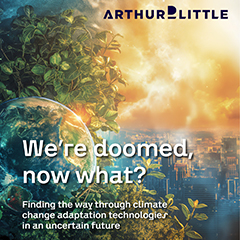When faced with prospective technology choices, executives often need to address three challenges: complexity, speed and cognition. Adaptation to climate change is no different. It is complex because climate impacts are local, multifactorial and highly variable; and also because there is a myriad of adaptation technologies available. By modeling potential scenarios we aim to cut through this complexity, providing CEOs with a clear guide to the potential technologies that their adaptation will require.
Dr. Albert Meige, Global Director of Blue Shift at Arthur D. Little
This report offers a refreshing new angle to climate action, namely that of businesses and their priorities for adapting to a challenging future. It provides the scenario-based context for the technologies outlined by WIPO GREEN, underscoring the essential role of innovation in forging a sustainable future. By detailing the functional expectations and key technologies necessary for adaptation, it highlights the need to integrate technological advancements within our business, economic and policy frameworks to effectively combat climate change.
Dr. Peter Oksen, Senior Program Officer at WIPO GREEN, comments
Five Scenarios for Business Resilience in the Face of Climate Change
The report uses a “+3°C by 2100” scenario, aligned with projections by the Intergovernmental Panel on Climate Change (IPCC), as a launchpad to explore five potential, non-exclusive pathways for adapting to climate change.
- Green communities: A resource-scarce world in which grassroots initiatives flourish, for lack of more ambitious projects; there is a pull towards greater decentralization, circularity, and frugality.
- Lonely at the top: Highly concentrated and competitive industries in which market leaders spearhead adaptation to build competitive advantage and keep satisfying consumers, while operating under increasing constraints.
- Wild Green West: A creative chaos in which private adaptation initiatives sprout everywhere, fuelled by private capital and hype, with no overarching strategy or consistency.
- Don’t Look Up: A bleak future in which neither customers nor finance institutions have adjusted to the new climate reality, leaving nothing but quick fixes and crisis management.
- Adaptation Surge: A world in which adaptation is the norm and the new currency, resetting expectations, creating new markets and new needs for differentiation, and possibly overengineering.
About Arthur D. Little
Arthur D. Little is an international management firm which provides insight into industry challenges, accelerating performance, innovation through convergence and digital, and creating a positive impact in the world.
About WIPO GREEN
WIPO GREEN is a UN-based, public, free platform that connects seekers of technology solutions to climate change and environmental challenges with solution providers from private, civil society and government sectors. Through its database, networks and acceleration projects, WIPO brings together key players to catalyze green technology innovation and diffusion.



